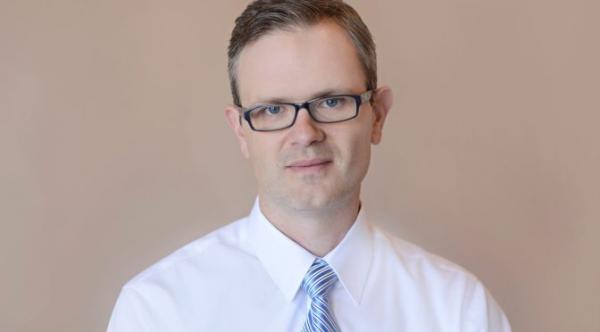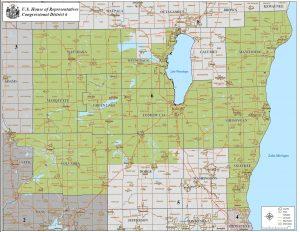2018 is an election year with plenty on the line at both the state and national level here in Wisconsin. Cannabadger will be following developments and talking to candidates through the Nov. 6 general election. Offices up for election include Wisconsin governor, attorney general, all 99 state assembly seats, half the state senate seats, one U.S. senate seat and all 8 congressional districts.
Map of Wisconsin 6th congressional district.
A supporter of the legalization of medical and adult use cannabis, Scott Olmer, is challenging Rep. Glenn Grothman for the Republican nomination in Wisconsin's 6th congressional district partisan primary, scheduled for August 14, 2018. After serving in the Wisconsin legislature as a state representative and later state senator, Grothman was first elected to Congress in 2014 after the retirement of former Rep. Tom Petri, who held the seat for three decades.
Grothman remains opposed to legalization of cannabis for medical and adult use, although he is a cosponsor of bipartisan federal legislation that would legalize industrial hemp nationally. In the video below, Rep. Grothman responds to a question regarding cannabis legalization at a 2017 town hall.
Below are Scott's responses to Cannabadger's questions about his candidacy:
Cannabadger: I watched the video of Rep. Grothman responding to the question about cannabis at the town hall and it seems to me he is going backwards on the issue. I remember lobbying his staff for medical cannabis in 2009 with a group of patients at the Wisconsin Capitol when he was a state senator and he walked in and ended up saying something "I have half a mind to vote for that bill". But he never followed through. Where do you stand on legalizing medical and adult use/recreational cannabis?
Scott Olmer: I'm a firm believer that cannabis should be a legalized for both medicinal and recreational use. I am also a realist to the current political environment-especially in Wisconsin-and understand that recreational legalization has a long way to go in order to get broad public support.
Cannabadger: I was unable to find any indication of where Dan Kohl. the Democratic candidate for Grothman's seat, stands on the cannabis issue. His uncle Herb was staunchly noncommittal and pretty much successfully resisted taking a position even on medical cannabis throughout his tenure. Do you know where Dan Kohl stands on cannabis?
Scott Olmer: I have not seen any public comments from Dan about his stance on cannabis.
Cannabadger: Wisconsinites overwhelmingly support legal access to medical cannabis under the care of a physician and the most recent Marquette Law School poll that asked about legalization, from July 2016, found 59% of Wisconsinites support legalizing cannabis. Why the disconnect with the public in your opponents and how do you plan on capitalizing on it?
Scott Olmer: The disconnect comes from two sources: one is pandering to a certain voting block-the 65 and older crowd. The other from the lobbyists and big donor groups like The Tavern League that provide vast sums of political donations to oppose it. Even the traditionally conservative-leaning Cato Institute has declared that legal medical cannabis is now the least partisan issue in America, with now 51% of self-described Republicans being for it. I plan on capitalizing on it by spreading our position to the voters in the district that we know are pro-legalization. Quite honestly, legalizing medical cannabis is the issue that I get asked most about. Surprisingly, the most fervent group in favor of it are people who tell me that they wouldn't consume it but see it as a great tax revenue generator and a personal decision that the government should have no say in.
Cannabadger: Cannabis remains a federal Schedule One substance under the Controlled Substances Act. What is your position on scheduling cannabis?
Scott Olmer: The highest rating cannabis should have is a schedule 2 drug. The fact that cocaine, meth, and Vicodin are schedule 2 while cannabis remains a schedule 1 is ridiculous. The schedule 1 label denotes that there is no medicinal value to the drug, yet due to being a schedule 1 drug, it severely limits the research done to prove its medical uses and effectiveness.
Cannabadger: What would your ideal federal cannabis legalization bill look like?
Scott Olmer: For a recreational legalization bill: While there are flaws with the current laws designed around the creation, distribution, and sale of alcoholic beverages (mainly with distribution monopolies), it could provide a template for the sale of cannabis. I'd like to see the individual states be siloed as such that the cultivation, distribution, and sale be completely in-state. Otherwise, I fear that states with better growing conditions could monopolize the market, pushing out local growers and sending our tax dollars and jobs to other states.
For a medical legalization bill: States like California and Washington who've had legal medical cannabis for years would be the template for a national bill. Those state laws have been refined and survived many legal challenges. Why reinvent the wheel?
Cannabadger: How can people learn more about your campaign?
Scott Olmer: I'm very active on social media. I'm scottolmer (one word) on twitter and Facebook. Same on Instagram-although I use that more for family pictures and less about politics. The campaign website is electscottolmer.com. Or email me directly at scott@electscottolmer.com.
We are a grassroots campaign, so any sharing, liking, retweeting goes a very long way in spreading our message throughout the district and state.
Cannabadger: Is there anything else you would like to add?
Scott Olmer: I'm a Seattle native and lived in Denver for 3 years prior to their legalization bills being passed. I can tell you that I've seen for myself and heard from family and friends only positive net effects of legalization in those states. In fact, a good friend of mine is a home builder north of Denver and has been very successful during their housing booms which he primarily attributes to the "weed boom" that Colorado has experienced since legalizing recreational cannabis. As Wisconsin figures out how to pay for our crippling roads, under-funded schools, and billions given to Foxconn, it only makes fiscal sense to pursue at a minimum the tax benefits that legalization of medicinal marijuana would bring to this state. Hopefully, our elected officials grow a spine and take on the lobbyists and the Tavern League to stand for something that the majority of Wisconsinites want (and have wanted for decades).


